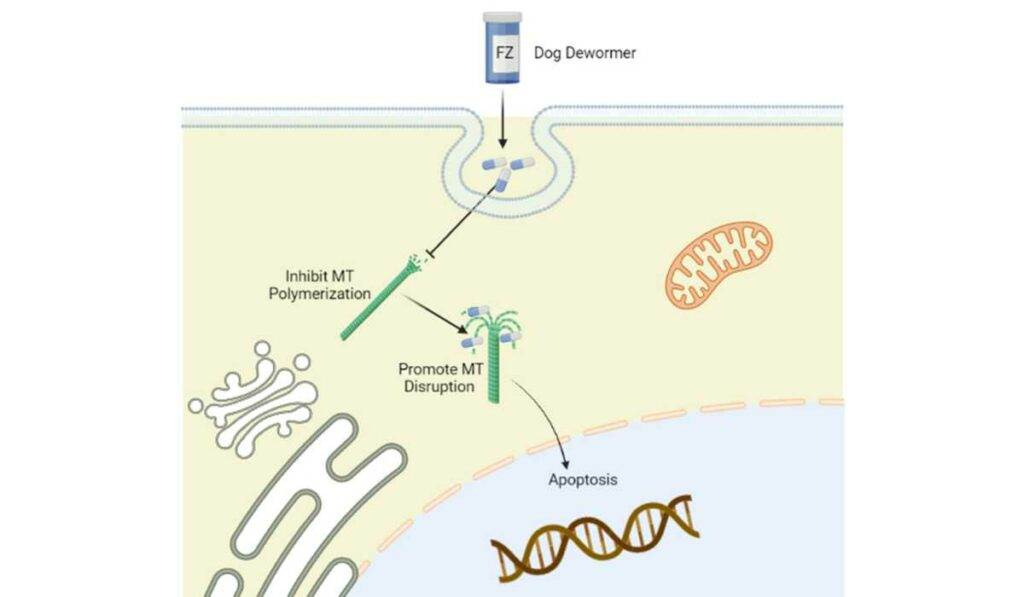Exploring the Controversy: Does Fenbendazole Cure Cancer?
The question of whether Fenbendazole can cure cancer has sparked considerable interest and debate within various circles. This article aims to provide a comprehensive exploration of Fenbendazole, its origins as a deworming agent, the scientific studies that have fueled speculation about its potential anti-cancer properties, and the controversies surrounding its use in cancer treatment. By delving into the available evidence and acknowledging the complexities of this topic, we aim to offer a nuanced understanding of Fenbendazole’s role in the context of cancer.
FenbendazoleHelp.org is a resource for informational purposes ONLY. Before making any decisions concerning any treatment protocol, it is advised to seek the advice of a qualified medical professional.
Understanding Fenbendazole:
Dewormer Roots:
Initially developed as a deworming agent for animals, Fenbendazole has a well-established history in veterinary medicine. Its primary mechanism of action involves disrupting microtubules, preventing the replication of parasitic cells. This traditional use has been widely successful, earning Fenbendazole a reputation as an effective and reliable treatment for various animal parasitic infections.
The Microtubule Connection:
The key to Fenbendazole’s efficacy lies in its ability to destabilize microtubules. This mechanism, while primarily targeting parasitic cells, has also sparked interest in its potential impact on rapidly degrading cancer cells. The notion that Fenbendazole might exert similar effects on cancer cells due to their heightened proliferation forms the basis of the discussions surrounding its potential anti-cancer properties.
Scientific Studies and Observations:
Preliminary Research:
Numerous studies and anecdotal reports, like the Joe Tippens Story among others, have explored Fenbendazole’s impact on cancer cells. Some early research suggested promising results, showcasing instances where Fenbendazole demonstrated effectiveness in causing the regression of tumors. These studies often highlight cases of diffuse large B-cell lymphoma, metastatic cancer, renal cell carcinoma, and bladder cancer.
Cautious Optimism:
While some researchers express cautious optimism about the potential applications of Fenbendazole in cancer treatment, it’s important to note that these findings are preliminary. Further research is needed to establish the exact mechanisms of action, and the overall efficacy of Fenbendazole in diverse cancer types.
Clinical Trials and Ongoing Research:
The scientific community recognizes the need for rigorous clinical trials to validate the potential benefits of Fenbendazole in cancer treatment. Ongoing research endeavors are exploring its safety, optimal dosage, and potential synergies with existing cancer therapies. These trials aim to provide conclusive evidence regarding Fenbendazole’s role in the complex landscape of cancer treatment.
Controversies and Skepticism:
Lack of Rigorous Clinical Trials:
A primary source of skepticism surrounding Fenbendazole’s role in cancer treatment stems from the absence of large-scale, well-controlled clinical trials. While preliminary studies are intriguing, the scientific community emphasizes the necessity of robust clinical evidence to support any claims of Fenbendazole as a “CURE” for Cancer.
Self-Experimentation and Anecdotal Evidence:
The internet is full of anecdotes of individuals self-administering Fenbendazole for cancer treatment successfully. These personal stories may inspire hope and are the fuel for many to do their research, to draw their conclusions about Fenbendazole’s efficacy. Groups like Fenbendazole – Cancer Support Group on Facebook among others, provide peer-to-peer research happening every day.
Regulatory Considerations:
Fenbendazole is approved for veterinary use, and its availability for human consumption varies across jurisdictions. The lack of regulatory approval for human cancer treatment raises questions about using Fenbendazole outside of its approved veterinary context. Fenbendazole belongs to the benzimidazole class of anthelmintic medications. Two other compounds in the benzimidazole class, Membendazole and Albendazole are listed by the World Health Organization (WHO) as 2 of the 400 most important medicines to humanity. This brings up the question of why two and not the other.
Potential Mechanisms of Action:
Microtubule Destabilization:
The primary mechanism through which Fenbendazole operates—microtubule destabilization—remains a central focus in discussions about its potential anti-cancer effects. The disruption of microtubules in rapidly dividing cells, a characteristic feature of cancer cells, forms the basis of the hypothesis that Fenbendazole could impede cancer cell replication.
Anti-Inflammatory and Immunomodulatory Effects:
Some studies suggest that Fenbendazole may possess anti-inflammatory and immunomodulatory properties. These additional effects could contribute to its potential impact on cancer progression and the immune response, although more research is needed to elucidate these mechanisms fully.
Patient Experiences and Perspectives:
Individual Responses and Testimonials:
A multitude of online testimonials and personal accounts describe individuals incorporating Fenbendazole into their cancer treatment regimens. It’s essential to recognize that individual responses to cancer treatments, including unconventional approaches like Fenbendazole, can vary significantly. Factors such as cancer type, stage, genetic makeup, and overall health contribute to the complexity of treatment outcomes.
Self-Experimentation and Informed Consent:
The implications of individuals self-experimenting with Fenbendazole for cancer treatment raise questions about safety monitoring and the responsible dissemination of information. Medical professionals underscore the importance of consulting healthcare providers before exploring unconventional treatment options, and regular monitoring should a person decide to determine their protocol. We recommend that individuals looking into Fenbendazole as an alternative treatment discuss it with their medical professionals.
Conclusion:
In conclusion, whether Fenbendazole can cure cancer is complex and multifaceted. While early studies and anecdotal reports suggest potential promise, the lack of human clinical trials and regulatory approval underscores the need for caution and further investigation. It’s crucial for individuals navigating a cancer diagnosis to approach alternative treatments, including Fenbendazole, with informed skepticism and in consultation with healthcare professionals. As the scientific community continues to explore the potential of Fenbendazole in cancer treatment, the journey toward conclusive evidence and regulatory recognition remains ongoing.
The post Exploring the Controversy: Does Fenbendazole Cure Cancer? appeared first on FenbendazoleHelp.org.







